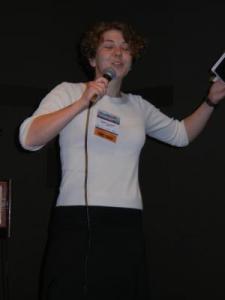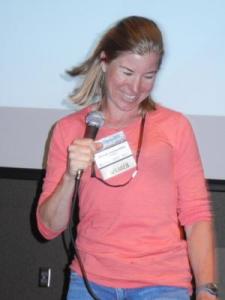By Carol Berkower
Helen Chappell was a AAAS mass media fellow at The News & Observer in Raleigh when she woke up with a face that itched, then swelled, then kept right on inflating until she drove herself to the hospital, where she received massive doses of antihistamines and a warning that she was severely allergic to … something. The cause of Chappell’s reaction might have remained a mystery, had she not recently interviewed an infectious disease specialist who’d made a passing reference to tick-induced meat allergy.
Chappell’s humorous recounting of her affliction, “How Science Writing Saved My Life,” was one of the highlights of the ScienceWriters 2011 opening session, which followed the high-energy format of an Ignite event. In rapid succession, ten presenters had exactly five minutes each to speak on a topic of their choice. Each presenter used twenty slides, which were set to auto-advance every 15 seconds.David Harris emceed the session in black tie, tux, and gleaming Oxfords, promising a “night of comedy, night of tragedy.” Tragedy was averted, and although humor was plentiful, it was served up with some genuine insights, one of which was to demonstrate just how many good ideas can be conveyed in five-minute increments.
Marie-Claire Shanahan translates primary research papers into language comprehensible to fifth- and sixth-graders. In her presentation, Shanahan used students’ critiques of these papers, written as only pre-teens can, to deliver pointed reminders of what all readers, regardless of age, want from a good science story.
In a talk titled “You’ve Got Mail, You Idiot!,” Christie Aschwanden drew on 13 years of letters from adult readers, sharing some delicious hate mail along with effusive praise – for the same articles, of course – and came to the conclusion that no amount of data can overcome personal prejudice, not only for readers but also for Aschwanden, and likely for the rest of us as well.Robert Frederick used his talk, “Disabling Technology,” to raise big questions rather than answer them. Do the electronic media we employ increasingly drive the message? (Do you think in sentences that have 140 characters or fewer?) How can professional writers compete with those who’d give it away for free, with multimedia thrown in? And how do we wrangle the technology so that it serves the purpose of good storytelling? In a talk titled “WorldClash!,” Clay Farris Naff described a “war of worldviews” that “science has to win or we all die.” Nonetheless, arguing for greater social interaction among those with different but compatible views, Naff noted that a healthy majority of Americans still claim to respect science, “theistic evolutionists” abound among the believers, and rationality is not the sole purview of non-believers.
Other talks dealt with the scanty coverage of linguistics in the popular press, the reflections of Ph.D. science writers on the value of their doctorates, and the anatomy of a love affair with cell biology. All presentations were received warmly by an audience that was clearly enjoying itself, indicating that future meetings would do well to continue the Ignite format and to retain its position in the lineup immediately after happy hour.





